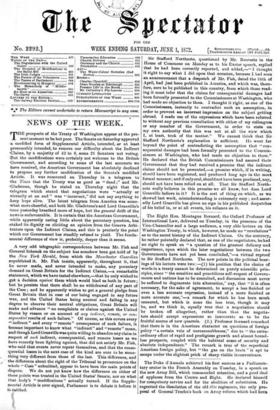The Right Hon. Montague Bernard, the Oxford Professor of International
Law, delivered on Tuesday, in the presence of the Vice-Chancellor and a large audience, a very able lecture on the Washington Treaty, in which, however, he made no "revelations" as to the secret history of the Indirect Claims. On the contrary, he rather pointedly declared that, as one of the negotiators, he had no right to speak on "a question of the greatest delicacy and importance, upon which the later negotiations between the two Governments have not yet been concluded,"—a virtual reproof to Sir Stafford Northeote. The new points in the political bear- ings of his lecture were two :—(1) his position that the choice of words in a treaty cannot be determined on purely scientific prin- ciples, since " the sensitive and punctilious self-respect of Govern- ments and nations has to be consulted, and discussion must never be suffered to degenerate into altercation," nay, that "it is often necessary, for the sake of agreement, to accept a less finished or even a less accurate expression, instead of a more finished or more accurate one,"—a remark for which he has been much censured, but which is none the less true, though it may be, and we think is, equally true that a negotiation should be broken off altogether, rather than that the negotia- tors should accept expressions so inaccurate as to be the fruitful source of new quarrels. (2.) Professor Bernard remarked that there is in the American character on questions of foreign policy "a certain vein of unreasonableness," due to " the extra- ordinary effect of rapid and prodigious growth and almost bound- less prospects, coupled with the habitual sense of security and absolute independence." The remark is true of the superficial American foreign policy, but "the gas on the brain " is apt to escape under the slightest prick of sharp visible inconvenience.


































